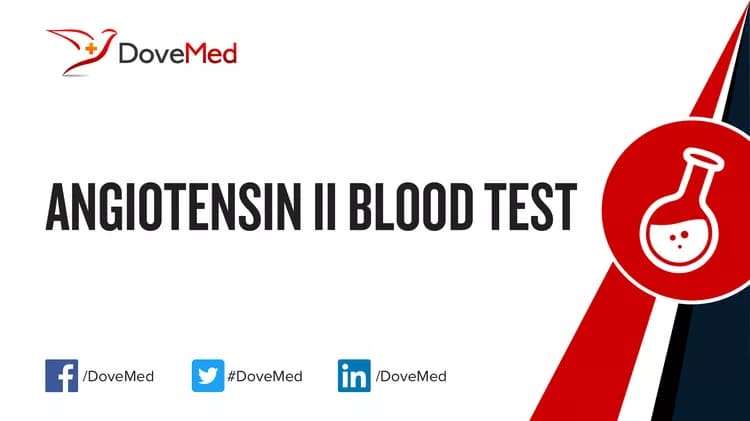What are other Names for this Test? (Equivalent Terms)
- Angiotensin II Levels Blood Test
What is the Angiotensin II Blood Test? (Background Information)
- Angiotensin II is a hormone that raises blood pressure by narrowing the blood vessels (“angio-“, vessel; “tension”, pressure) and other effects. It is made from angiotensin I and gets converted to angiotensin III
- The first step in the production of angiotensin II is the release of angiotensinogen from the liver.
- When the kidneys sense that the blood pressure has dropped, they release in blood an enzyme called renin. Renin converts angiotensinogen to angiotensin I. Angiotensin-converting enzyme (ACE) then converts angiotensin I to angiotensin II. To a lesser extent, this conversion is also carried out by other enzymes
- ACE is made in the walls of the blood vessels. It plays a key role in increasing blood pressure by contracting the blood vessels. ACE not only creates angiotensin II, but also deactivates bradykinin, a protein that widens the blood vessels
- Angiotensin II causes the kidneys to reabsorb sodium (and thus water), which increases blood volume. This results in higher blood pressure and more blood being pumped by the heart. Angiotensin also causes small arterioles to constrict. This contributes to increased blood pressure
- Lastly, angiotensin II stimulates the sympathetic branch of the nervous system, which initiates the fight-or-flight response. Among the effects of this response is the tightening of blood vessels and the increase in blood pressure
- Aside from the kidneys, blood vessels, heart, and nervous system, angiotensin II also acts on the adrenal glands and brain to increase the blood pressure. Enzymes convert angiotensin II to III and then IV, which decreases its function
- The Angiotensin II Blood Test helps assess the levels of angiotensin II in blood. It is used to investigate the causes for high blood pressure
What are the Clinical Indications for performing the Angiotensin II Blood Test?
Following are the clinical indications for performing the Angiotensin II Blood Test:
- Following up to a finding of high blood pressure
- Headache
- Abnormal heartbeat
- Trouble breathing
- Discolored urine
- Fatigue
- Vision defects
How is the Specimen Collected for the Angiotensin II Blood Test?
Following is the specimen collection process for Angiotensin II Blood Test:
Sample required: Blood
Process of obtaining blood sample in adults:
- A band is wrapped around the arm, 3-4 inches above the collection site (superficial vein that lies within the elbow pit)
- The site is cleaned with 70% alcohol in an outward spiral, away from the zone of needle insertion
- The needle cap is removed and is held in line with the vein, pulling the skin tight
- With a small and quick thrust, the vein is penetrated using the needle
- The required amount of blood sample is collected by pulling the plunger of the syringe out slowly
- The wrap band is removed, gauze is placed on the collection site, and the needle is removed
- The blood is immediately transferred into the blood container, which has the appropriate preservative/clot activator/anti-coagulant
- The syringe and the needle are disposed into the appropriate “sharp container” for safe and hygienic disposal
Preparation required: No special preparation is needed prior to the test.
What is the Significance of the Angiotensin II Blood Test Result?
The significance of the Angiotensin II Blood Test result is explained:
- A high test value may indicate:
- Renin-secreting juxta-glomerular renal tumor
- Volume depletion
- Congestive heart failure
- A low test value may indicate:
- Kidney damage or failure
- Primary aldosteronism
- Cushing syndrome
The laboratory test results are NOT to be interpreted as results of a "stand-alone" test. The test results have to be interpreted after correlating with suitable clinical findings and additional supplemental tests/information. Your healthcare providers will explain the meaning of your tests results, based on the overall clinical scenario.
Additional and Relevant Useful Information:
- Certain factors interfere with the results of the Angiotensin II Blood Test. These include hydration status, sodium intake, stress, and pregnancy
- Some blood pressure medications decrease blood pressure by inhibiting angiotensin-converting enzyme (ACE) and preventing the formation of angiotensin II. These medications are called ACE inhibitors
Certain medications that you may be currently taking may influence the outcome of the test. Hence, it is important to inform your healthcare provider of the complete list of medications (including any herbal supplements) you are currently taking. This will help the healthcare provider interpret your test results more accurately and avoid unnecessary chances of a misdiagnosis.
The following DoveMed website link is a useful resource for additional information:
https://www.dovemed.com/common-procedures/procedures-laboratory/ace-test/
Please visit our Laboratory Procedures Center for more physician-approved health information:
http://www.dovemed.com/common-procedures/procedures-laboratory/
Related Articles
Test Your Knowledge
Asked by users
Related Centers
Related Specialties
Related Physicians
Related Procedures
Related Resources
Join DoveHubs
and connect with fellow professionals


0 Comments
Please log in to post a comment.